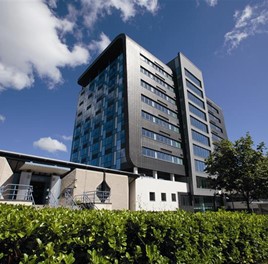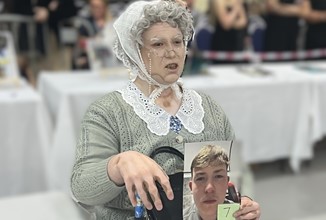
Applied Science - Level 2
Start Date: 1st September 2026

- Length 1 year
- Study Full-Time
- Location Rye Hill Campus
Qualification Gained
BTEC First Award in Application of Science and BTEC First Award in Principles of Applied Science
Levels ExplainedMore about the course
Do you have an interest in biology, chemistry and physics? Are you keen to learn how the body works or investigate human behaviour? This Applied Science course will develop your science and laboratory skills.
You will explore topics such as the living body, chemistry and our Earth, energy and our universe, investigating a crime scene and investigating human behaviour.
You will learn from tutors who have extensive industry experience across a range of roles including social work, lab technician, process engineering and multi-national chemical companies.
You will also have the opportunity to complete work experience and may be asked to take part in skills competitions.
Get In Touch
Meet our staff and students
Science at Newcastle College

What can I do with a qualification in Science?
Daily tasks:
- Develops procedures for quality control of manufactured products.
- Tests techniques and processes for reliability under a variety of conditions.
- Analyses results and experimental data.
- Conducts experiments to identify chemical composition, energy and chemical changes in natural substances and processed materials.
- Develops experimental procedures, instruments and recording and testing systems.
Powered by EMSI
Daily tasks:
- Monitors the distribution, presence and behaviour of plants, animals and aquatic life, and performs other scientific tasks related to conservation not performed by jobholders in MINOR GROUP 214: Conservation and Environment Professionals.
- Advises farmers, medical staff and others, on the nature of field crops, livestock and produce and on the treatment and prevention of disease.
- Observes the structure of communities of organisms in the laboratory and in their natural environment.
- Researches the effects of internal and external environmental factors on the life processes and other functions of living organisms.
- Performs tests to study physiological and pathological characteristics within cells and other organisms.
- Identifies and studies the chemical substances, including microbial infections, involved in physiological processes and the progress of disease.
- Studies the physical and chemical form, structure, composition and function of living organisms.
Powered by EMSI
Daily tasks:
- Applies mathematical models and techniques to assist in the solution of scientific problems in industry and commerce and seeks out new applications of mathematical analysis.
- Observes, records and collates data on atmospheric conditions from weather stations, satellites, and observation vessels to plot and forecast weather conditions.
- Uses surveys, seismology and other methods to determine the earth.
- Conducts experiments and tests and uses mathematical models and theories to investigate the structure and properties of matter, transformations and propagations of energy, the behaviour of particles and their interaction with various forms of energy.
Powered by EMSI
What can I do with a qualification in Science?
Chemical scientists
Daily tasks:
- Develops procedures for quality control of manufactured products.
- Tests techniques and processes for reliability under a variety of conditions.
- Analyses results and experimental data.
- Conducts experiments to identify chemical composition, energy and chemical changes in natural substances and processed materials.
- Develops experimental procedures, instruments and recording and testing systems.
Powered by EMSI
Biological Scientists and Biochemists
Daily tasks:
- Monitors the distribution, presence and behaviour of plants, animals and aquatic life, and performs other scientific tasks related to conservation not performed by jobholders in MINOR GROUP 214: Conservation and Environment Professionals.
- Advises farmers, medical staff and others, on the nature of field crops, livestock and produce and on the treatment and prevention of disease.
- Observes the structure of communities of organisms in the laboratory and in their natural environment.
- Researches the effects of internal and external environmental factors on the life processes and other functions of living organisms.
- Performs tests to study physiological and pathological characteristics within cells and other organisms.
- Identifies and studies the chemical substances, including microbial infections, involved in physiological processes and the progress of disease.
- Studies the physical and chemical form, structure, composition and function of living organisms.
Powered by EMSI
Physical Scientists
Daily tasks:
- Applies mathematical models and techniques to assist in the solution of scientific problems in industry and commerce and seeks out new applications of mathematical analysis.
- Observes, records and collates data on atmospheric conditions from weather stations, satellites, and observation vessels to plot and forecast weather conditions.
- Uses surveys, seismology and other methods to determine the earth.
- Conducts experiments and tests and uses mathematical models and theories to investigate the structure and properties of matter, transformations and propagations of energy, the behaviour of particles and their interaction with various forms of energy.
Powered by EMSI
Good to know
What's happening?


October Open Event
Rye Hill Campus
Wednesday 1st October 2025
5:00pm - 7:00pm

Either
- The level required to start the course
- The level rewarded when completing the course
Not a Newcastle College student?
If you are not currently a Newcastle College student, apply here:
VISIT UCASNewcastle College students
If you are a current Newcastle College student, apply here:
CURRENT STUDENT APPLICATIONor Continue Browsing
Course Added
This course has now been added to your basket. Please click below to apply now or continue browsing.
Apply Now Levels Explained
Levels Explained
 College or Sixth Form. What's the difference?
College or Sixth Form. What's the difference?
 How to Apply
How to Apply
 16 to 18 Support
16 to 18 Support


